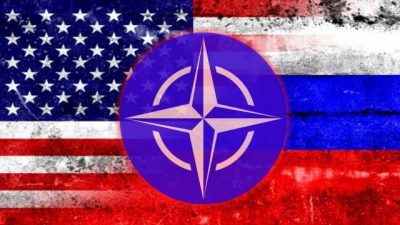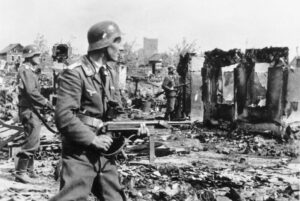What Does “Unprovoked” Mean? NATO vs. Russia. Provoked or Unprovoked Invasion?

All Global Research articles can be read in 51 languages by activating the Translate Website button below the author’s name.
To receive Global Research’s Daily Newsletter (selected articles), click here.
Follow us on Instagram and Twitter and subscribe to our Telegram Channel. Feel free to repost and share widely Global Research articles.
***
Note the following sentence in a New York Times news story yesterday by Michael Schwirtz and Anton Troianovski about Russia’s invasion of Ukraine: “Mr. Putin’s attempt to put a veneer of nobility on an unprovoked invasion that has killed thousands of civilians and turned millions more into refugees was made in the Russian city once known as Stalingrad, on the 80th anniversary of a victory there against Nazi Germany that changed the course of World War II.” (Italics added.)
The operative word is “unprovoked.”
First of all, it’s a strange word for news reporters to be using because it’s more in the nature of a commentary or editorial. News reporters are supposed to report the news, and the editorial department of a newspaper is supposed to render opinions and commentary on the news. Schwirtz and Troianovski do both in their news article.
Second, and more important, for the life of me, I cannot understand how Schwirtz and Troianovski are unable to see that Russia’s invasion was provoked. It was provoked knowingly, intentionally, and deliberately.
Now, one could argue that Russia’s invasion of Ukraine wasn’t justified. That’s a different word from “unprovoked.” An invasion can be “provoked” and “unjustified” at the same time. My hunch is that Schwirtz and Troianovski meant to use the word “unjustified” rather than the word “unprovoked.”
When the Berlin Wall came crashing down in 1989, the Soviet Union withdrew its troops from Eastern Europe, the Warsaw Pact was terminated, and the Soviet Union was dismantled. As far was Russia was concerned, the Cold War was over.
Not so, however, for the United States and, specifically, for the Pentagon, the CIA, and the NSA. The Cold War had been very beneficial to the U.S. national-security establishment in terms of ever-increasing power within the federal governmental structure and ever-increasing taxpayer-funded largesse to finance America’s Cold War military machine, including its vast army of voracious “defense” contractors who had become dependent on feeding at the public trough.
Thus, while Russia was ready to move on, the U.S. national-security establishment was not. It was determined to not let go of its Cold War racket.
NATO had been brought into existence after World War II to ostensibly protect Western Europe from an invasion by the Soviet Union. But the notion of such an invasion was ludicrous from the start. Russia had been devastated by the war. As many as 27 million Soviet citizens were killed as a result of the war. That’s 27 million people! That’s a lot of people. Moreover, the entire industrial might of the country had been decimated.
The Soviets knew that if they started a war with their former World War II partners and allies, the United States would immediately come to their assistance. The United States had not suffered any damage to its industrial capacity and was still fully capable of fielding a massive army. Moreover, the United States had a monopoly on nuclear bombs and had displayed a willingness to use them against people living in populated cities. Thus, there was never any realistic possibility whatsoever that the Soviet Union was going to invade Western Europe. NATO served no purpose whatsoever.
 Recall that one of the major reasons for all the death and destruction that Russia had experienced during the war was Germany’s surprise invasion of the Soviet Union, an invasion that almost resulted in the German conquest of Russia. German troops made it all the way to Stalingrad before they met with defeat, owing to the tenacity of the Russian people and the brutality of the Russian winter.
Recall that one of the major reasons for all the death and destruction that Russia had experienced during the war was Germany’s surprise invasion of the Soviet Union, an invasion that almost resulted in the German conquest of Russia. German troops made it all the way to Stalingrad before they met with defeat, owing to the tenacity of the Russian people and the brutality of the Russian winter.
Make no mistake about it: Germany’s near-conquest of their country — and the massive death and destruction wreaked by Germany on their country — was seared into the collective conscience of the Russian people. No Russian generation will ever forget it. Thus, when Germany decides to send tanks to Ukraine in the hopes that Ukraine ultimately joins NATO, which would enable German tanks, troops, and missiles to be aligned on Russia’s border, one should be able to at least understand why the Russian people might feel a bit uneasy about that.
In fact, Schwirtz’s and Troianovski’s news article mocked Russian president Vladimir Putin for using the 80th anniversary of Russia’s victory at Stalingrad to deliver a speech about the war in Ukraine. In their mockery, Schwirtz and Troianovski are clearly unable to draw the link between Germany’s near conquest of Russia and Germany’s current thirst to incorporate Ukraine into NATO, which would enable Germany to put its tanks, missiles, and troops along Russia’s border.
Once the Cold War was over, NATO had fulfilled its ostensible mission. There was no longer any threat of the Soviet Union invading Western Europe. Thus, this old Cold War dinosaur clearly should have gone extinct.
Instead, the Pentagon decided to keep NATO in existence and, even worse, began using NATO to absorb former members of the Warsaw Pact, which was enabling the United States and Germany to move their troops, missiles, bases, and armaments eastward, i.e., ever closer to Russia’s border.
Throughout this process, Russia was, not surprisingly, vehemently objecting. Russia continuously asked: If the Cold War was really over, then what was the point of doing this? NATO’s answer was that there was nothing to be concerned about. The United States and Germany were both peace-loving nations that would never aggress against Russia.
That, of course, is a ridiculous notion. For its part, Germany had already aggressed against the Soviet Union in World War II, which had resulted in 27 million Russian deaths, the total destruction of the country, and the near-conquest of Russia. For its part, the United States was, in the words of Martin Luther King, “the greatest purveyor of violence in the world.”
How could anyone not understand why Russia would be concerned about NATO’s expansion toward Russia’s border, especially when there was no good reason to do so?
As Russia continuously objected to NATO’s expansion, Russia made it clear that there was one “red line” that would finally provoke a Russian reaction — the threat to absorb Ukraine into NATO. That would enable Germany and the United States to place their tanks, nuclear missiles, bases, armaments, and troops on Russia’s border. Given Germany’s prior invasion of the Soviet Union and the U.S. propensity for violence, that was unacceptable to Russia.
The United States and Germany, operating through NATO, knowingly, intentionally, and deliberately crossed that “red line,” knowing full well that it was a “red line” for Russia. By threatening to absorb Ukraine into NATO, they knew that Russia would respond because Russian had said that it would respond.
Thus, when President Biden claimed that his “intelligence” had learned that Russia would invade Ukraine, he was being disingenuous. He knew Russia would invade because Russia had been saying it would invade if the United States, Germany, and other NATO powers crossed its “red line” by threatening to absorb Ukraine into NATO.
Thus, there is no doubt that the Pentagon, operating through NATO, did provoke Russia into invading Ukraine. Again, one can argue that the Pentagon’s action did not justify the Russian invasion of Ukraine, but one cannot rationally say that Russia’s invasion was “unprovoked,” as Schwirtz and Troianovski did yesterday in their news story in the New York Times.
*
Note to readers: Please click the share buttons above. Follow us on Instagram and Twitter and subscribe to our Telegram Channel. Feel free to repost and share widely Global Research articles.

